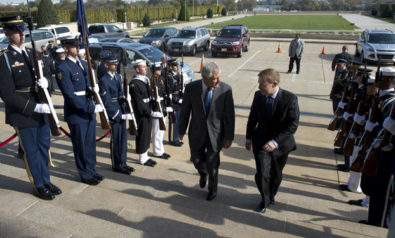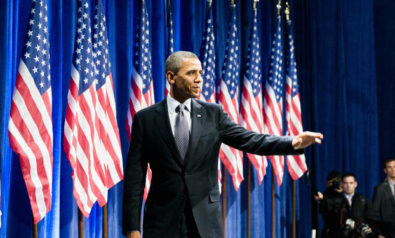Washington's shift toward Asia has provoked feelings of insecurity within the region.
Background
Following promises of increased economic integration, US President Barack Obama canceled his Asia tour last October, due to the government shutdown, missing two summits: the Asia-Pacific Economic Cooperation (APEC) and the East Asia Summit, organized by the Association of Southeast Asian Nations (ASEAN).
Obama's absence attracted criticism from leaders across Asia, who compared the US president's ability to run his own country with his capacity to maintain commitments to the international community.
Secretary of State John Kerry attended the APEC and ASEAN conferences in Obama’s place, while Vice President Joe Biden toured Japan, China and South Korea in December. Biden’s trip put the international spotlight back on political tensions in Northeast Asia — more specifically on China’s Air Defense International Zone (ADIZ), historical territorial disputes, and commitments to maintaining regional security.
The important question is not whether Washington will be able to successfully rebalance toward Asia, but what the US has already done to reposition itself in the region. The US has used different tactics to engage with countries in the Asia Pacific; for example, by focusing on regional cooperation through ASEAN, the Lower Mekong Initiative and, since 2011, the Trans-Pacific Partnership (TPP).
Why is the US Rebalance Relevant?
As the largest economy and political power in the Asia Pacific, China’s dominance within the region has remained an issue on contention, while Beijing has not yet joined the TPP.
However, China’s vexation with the US rebalance is known. It considers the rebalance to be a US security effort, with the aim of increasing American military dominance in the area, in China’s geopolitical region.
Even with current concerns over the US Congress consenting to Obama’s push for engagement with the TPP, composed by a regional free trade agreement (FTA), the negotiations from this deal would further solidify American economic trade with global partners from Chile to Brunei.
The reluctance from domestic US politics contributes to hesitations within Asia. ASEAN relations with the US have had successes, but tellingly, not all ten ASEAN countries have agreed to join the TPP. ASEAN has already instituted a Regional Comprehensive Economic Partnership (RCEP) amongst all its members and FTA partners, including Australia, China, India, Japan, South Korea and New Zealand. While plans have been put in place to dissolve the RCEP partnership by the end of 2015, questions remain over whether or not the participating countries would seriously consider transitioning into the TPP.
Realignment through defense in the Asia Pacific has already begun. In the US Department of Defense’s (DOD) publication, Defense Budget Priorities and Choices Fiscal Year 2014, the purpose of a budget request shows significant emphasis on preparing for a rebalance to Asia. The DOD stresses its use of Guam as a strategic location in addition to reaffirming positive relations with Australia. With congressional approval of the National Defense Authorization Act (NDAA) for 2014, funding has been granted for a rebalance to the Asia program.
Only time will tell over the willingness of international actors to adjust to a more noticeable US presence. With Obama’s next scheduled trip to Asia in April, there is potential to secure footing in the region. Furthermore, an inaugural US-ASEAN Defense Forum, planned to be held in April and hosted by US Defense Secretary Chuck Hagel, confirms the US government’s commitment to realignment through regional cooperation and defense.
However, although military support for the rebalance is clear, economic and political stability within the region will be the deciding factor in the success of the US rebalance toward Asia. Despite global crises over the past few years, the Chinese government has constantly published gross domestic product (GDP) figures which show a stable, growing economy.
Whether these figures are accurate or not is debatable, but what is certain is that the economies of countries across Asia are heavily dependent on China and therefore need relations not to be strained by closer ties with the US. As a result, it is imperative that the US government redirects focus in its rebalance efforts not only to ASEAN and the TPP, but also to Sino-US relations.
For more than 10 years, Fair Observer has been free, fair and independent. No billionaire owns us, no advertisers control us. We are a reader-supported nonprofit. Unlike many other publications, we keep our content free for readers regardless of where they live or whether they can afford to pay. We have no paywalls and no ads.
In the post-truth era of fake news, echo chambers and filter bubbles, we publish a plurality of perspectives from around the world. Anyone can publish with us, but everyone goes through a rigorous editorial process. So, you get fact-checked, well-reasoned content instead of noise.
We publish 2,500+ voices from 90+ countries. We also conduct education and training programs on subjects ranging from digital media and journalism to writing and critical thinking. This doesn’t come cheap. Servers, editors, trainers and web developers cost money.
Please consider supporting us on a regular basis as a recurring donor or a sustaining member.
Support Fair Observer
We rely on your support for our independence, diversity and quality.
Will you support FO’s journalism?
We rely on your support for our independence, diversity and quality.






